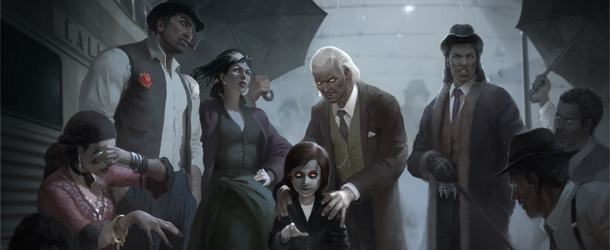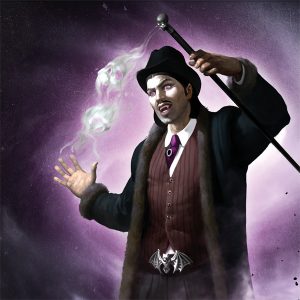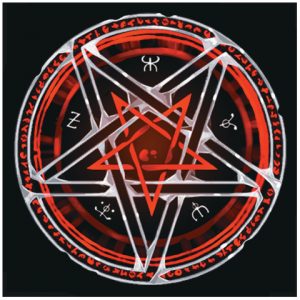The fifth story of Masters of the Night Anthology, written by Gareth Hanrahan, presents Ishtvan. The volume brings six stories, one for each vampire of the Family, and four of them were already posted: Laszlo, Imre, Mila, and Nevena.
If nothing else, the sergeant thought, no-one could say they did not have plenty of warning.
They’d heard plenty of stories from the locals. The castle’s haunted, they said. Monsters live there. The lord of the castle is a devil, a wamphyr, Un-Dead. The castle’s built atop a gate to hell, and no-one who goes there ever returns.
After two nights in the castle, the sergeant believed it all.
But now he was out. He was out in the sunlight and fresh air.
He walked down the grassy slope towards the general’s tent, and for a moment he let himself believe it was all a nightmare.
Three days ago.
“Sergeant,” said the general. “The locals tell me that some of their kinfolks were taken to that castle. Take a dozen men and search that ruin. If anyone is inside, make them leave. If they refuse, tell them that I intend, in the name of the Kaiser, to level the castle with artillery if needs be.”
A foolish man might have made a joke about the general being scared of ghost stories about ghouls and monsters. An impetuous man might wonder aloud why someone wanted an apparently abandoned medieval castle of no particular strategic significant destroyed. A paranoid man might suspect the general’s mysterious advisors of having some ulterior motive. A superstitious man might fear to cross the threshold of that foreboding castle. But the sergeant was none of those things, so he held his tongue. He saluted and turned smartly on his heel.
“Sergeant?”
“Yes, sir?”
“If for any reason you fail to return within three days, I shall commence firing regardless.”
A dozen men entered the castle, under the sergeant’s command. He tried not to take their number as an omen.
At first, they thought the place deserted. The outer buildings had clearly been abandoned for many years, and left to fall into ruin. Hollow windows like eyes stared down at them as they crossed the first courtyard. Ravens croaked on the battlements, and showed no concern at the presence of the soldiers.
Then, they started to find the horrors.
A prison – empty now, manacles bolted to the walls. Cage after cage. How many unlucky souls had been dragged out of the villages in the valleys below, and brought here to this lonely gaol? And where were they now?
In a crumbling tower, the topmost level open to the sky, they found a room scrawled with strange sigils and runes that seemed to spin and churn. Not even the strongest of them could stay in that room for more than a few minutes without feeling sickened, and when dusk fell, the stars visible from that tower were unlike any seen from Earth.
In the keep, they arrested two servants, an old man and an old woman. Both of them fought like devils when the soldiers dragged them out of the kitchen, clawing and scratching, but in complete silence. When the sergeant tried to question them, he discovered that neither of them had tongues.
The first night, they camped in a magnificent library on the second level of the keep. Thousands upon thousands of books, bound in strange leather. The soldiers opened a few of the books, and quailed at what was written there. They tore the cursed pages out of the books, and stacked them in the fireplace, and soon a fire roared in the grate, driving away the unholy chill of the castle.
One by one, they slept, apart from the sentries. The sergeant claimed a heavy armchair next to the fire, and tried to rest.
He woke to find a man standing by the fire. Tall he was, and pale, so pale that he seemed to be made of smoke. His eyes, too, were blazing sparks, red as the flames of hell. He was dressed in fine clothes, and in his hand he carried a cane topped with a silver skull.
“I am Ishtvan, the master of this place. I see you have made yourself at home here, already. Had you not detained my servants, I would have them cook you up such a feast as you cannot conceive. I have plenty of meat in my larder.” The man smiled, and the sergeant could sense a great flood of fury, deep and cold as the blackest ocean, dammed up behind that smile.
The sergeant wondered what sort of meat might be in that larder. He thought of the tales of kidnapped villagers, of the row of cages near the gatehouse, and the thought was like a lead weight in his stomach. “I have been ordered to ensure that this castle is evacuated,” said the sergeant. “In the name of the Kaiser.”
“Oh, I think you’re here on behalf of someone else. Men who want to destroy me, and my work.”
“What work is that?”
Ishtvan drew himself up. “The great work. I studied at the Scholomance, in the devil’s school under the lake. I delved into tombs in Egypt and Mesopotamia. I have conversed with the lords of the abyss, and seen what lies on the other side of the fire.
I am on the verge of triumph. They will not stop me. You, certainly, will not stop me.”
“Is that so?” said the sergeant. He reached forward, his hand passing through the smoky form of Ishtvan, and he grabbed a burning stick from the fire. “And if I set fire to this library, will that stop you?”
The smile faded a little. The dam cracked, a little. “Leave at dawn, and I shall spare you,” snarled Ishtvan, and he was gone.
Dawn turned the sky blood-red.
“Sir,” said one of the soldiers, “we’ve found no sign of any captives. I doubt there’s a living soul in this ruin other than those two.” He pointed over at the two silent servants.
“Keep looking,” ordered the sergeant. “But keep four men stationed in the library at all times.” The library was their leverage. As long as he held the library, as long as he held all those books hostage, they were safe.
In the mid-morning, they found the stairs. The whole mountain peak appeared wormed with tunnels, chambers and passageways carved into the rock. The soldiers brought two sets of remains about that ghastly underworld, and laid the clothwrapped bundles on the cobbles of the courtyard.
“Show me,” ordered the sergeant.
“It’s… it’s vile, sir,” said the corporal. The corporal was a veteran of many battles; he and the sergeant had slogged through shell-blasted muddy fields, waded through the guts of comrades exploded by artillery or torn apart by machine gun fire, and even his hands shook as he unwound the sheet. Scorched flesh. Twisted bones. A skull that might once have been human, but appeared to have melted and reformed, the tattered flesh clinging to it bearing signs of the same unholy transformation.
“How deep,” asked the sergeant slowly, “do those tunnels go?”
“I can’t say, sir.”
Maybe deeper than any artillery bombardment might reach.
“Keep looking.”
They found horrors in the tunnels all afternoon. The men would go below for a few hours, then return, gasping for air, desperate for sunlight, shaken and pale. Ravenous, too, as if they had been gone for days. They spoke of chambers in the depths, of temples to unknown gods, and laboratories, where things in jars whispered to one another. Whispering voices in the darkness, luring them deeper.
Crypts and unquiet tombs.
Strangest of all, the accounts of each man differed. One by one, they’d report to the sergeant – he felt like a confessor – and tell him what they saw down there.
Each of them described different horrors. He did not know if each man had truly seen different things, or if they’d been down there so long they remembered only a fraction of their experiences.
That evening, he set six men down.
Only three came back.
And only two were still alive.
They laid the corporal’s body down next to the misshapen horrors. Neither of the survivors could recall how he’d died; in their confused accounts, they just suddenly became aware they were dragging a body with them through the labyrinth.
Time to leave.
“Bring these bodies to the library,” ordered the sergeant. “Then set fire to the place. Burn it all. We’re leaving.”
From a corner of the courtyard, a strange sound. The two servants, gasping and choking. After a moment, he realized they were laughing without tongues.
“Should we…” asked one of the solders, his rifle aimed at the ghastly pair.
“No. Just the dead.”
It all went to hell.
The corporal came back to life when they brought his corpse to the library.
He sprang up, the fires of hell burning in his eyes, horns of bone bursting from his scalp. Clawed hands tore out the throats of the two men carrying him. With supernatural speed, he rushed forward and slammed the great doors of the library shut, crushing the foot of a third soldier who failed to get clear in time.
They retreated to the courtyard. The gates of the castle were shut, too, and a ghastly symbol scrawled across them in blood. No matter how hard they tried, they could not force them open.
They were trapped.
The second night, the survivors took refuge in one of the ruined towers. It was a small room, but there were few of them left, and they could hold out there against the things that roamed the courtyard, against the demons that crawled out of the earth. The sky above the castle was a churning purple, like the whole mountain had been plunged into the depths of the ocean and they were all drowning. Five men left. Five men and the sergeant.
“Sir,” said one of them, “there’s someone out there.”
The demons howled and hissed, but did not attack the sergeant as he left the refuge. He crossed the courtyard, marching with all the dignity he could muster.
A braver man might not have shaken so visibly. A cleverer man might have found some other way out. A wiser man would never had come here. But the sergeant was none of those things.
He saluted. Ishtvan smiled, and this time there was mirth behind the smile.
“Your man has found a new vocation as my librarian, it seems,” said the vampire, bowing. “My work shall continue. Tonight, through my demonic arts, I can make a handful of mortals into my servants. On a night to come, though, the whole world shall be mine.”
“The enemies you spoke of – they’ll stop you. They’ll hunt you down.”
“Oh, they’ll try. But they’re scared of me. They sent you in here, didn’t they, instead of coming themselves.”
“They have cannons. They’ll level this cursed place from a distance. I am a simple man, sir. I know nothing about demons or ghosts – but I have faith in the artillery corps of the Royal Hungarian Army.”
Ishtvan clicked his tongue. “When do they start firing?”
“At dawn on the third day.”
“Well then,” said Ishtvan, raising his cane. “There is a saying – welcome the coming, speed the parting guest. You should go, sir, and quickly.”
“My men?”
“Oh, they shall die horribly. Devoured from within or without. Set alight. Eaten. Drained of blood.”
“I won’t leave them to such a fate.”
The tip of the cane was sharp as a knife. With a _ ourish, Ishtvan carved a sigil on the sergeant’s throat.
“Oh, I’m not sparing you.”
At dawn, the sergeant alone departed the castle and made his way down the hillside to the army camp below. He made straight for the general’s tent. The general was there, cloistered with his advisors.
“Sergeant? What have you to report?” demanded the general.
“A message for you, sir,” said the sergeant, and then the sigil set fire to his blood, and soon there were no living men in that tent or on the hillside.
***
In the next article, read the story featuring Agnieszka.













